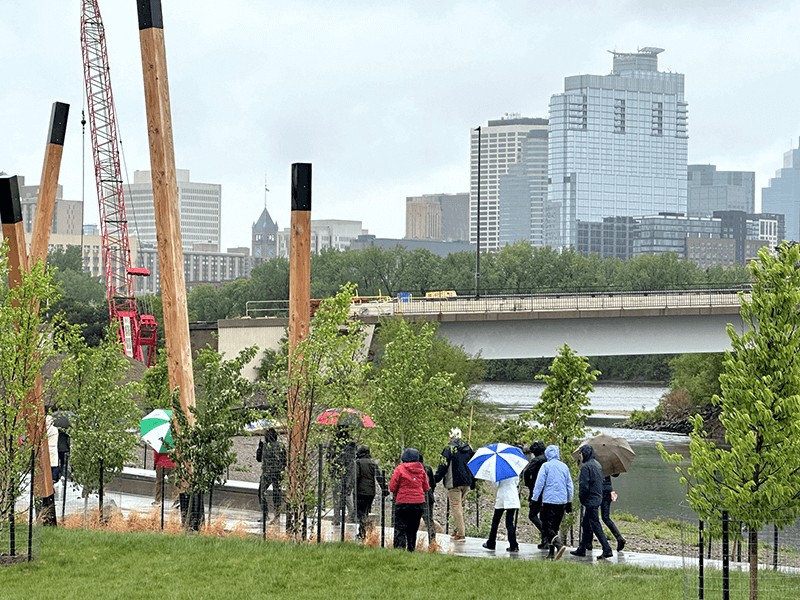
A walking tour out on a rainy day. (Karen R. Nelson)
A brisk breeze, rain showers and Canada geese provided the backdrop for a tour of Graco Park, Northeast Minneapolis’ new nine-acre site on the Mississippi River.
The May 20 Walk & Talk event was helmed by officials from the Minneapolis Park & Recreation Board (MPRB) and other park planners. “Most of the team are here, which says a lot about their vision,” said MPRB’s Jon Duesman, a landscape architect who has been involved in the project since 2014. “We couldn’t be more proud.”
The talk commenced in The River Hub — a new multi-use park building — with a greeting from Jocelyn Hale, interim executive director of the Minneapolis Parks Foundation. The building is a “Net Zero” structure, consuming only as much energy as can be generated onsite through solar and geothermal systems.
To encourage public gatherings and environmental, art and technology education, The River Hub encompasses event, meeting and class space, including the Spark’d Studio, a multi-media center intended to attract young people.
Outside, where an empty industrial field once stood, the expansive park now reflects a commitment to sustainability: a Riverwalk terrace, scenic overlook and gravel beach, pollinator lawns and native plantings, a stormwater-friendly central gathering place and a picnic/performance area. On-site timber markers and wooden benches serve as a nod to the area’s history as a logging site and to Scherer Bros. Lumber Co., which owned the site from 1963 to 2010.
While Graco Park opened last fall, The River Hub officially debuted on May 10, so the Walk & Talk was a hot free ticket with 100-some registrants. About 40 people, outfitted with raincoats and umbrellas, ended up attending.
Participants would soon learn that Graco Inc., the park’s namesake and key partner, plans to leave Northeast Minneapolis in two years. The May 21 announcement was a surprise to the city of Minneapolis, among others. The 100-year-old global company, which manufactures industrial pumps and spray equipment as well as baby car seats and strollers, plans to build a new headquarters in the northwest suburbs of Rogers or Dayton.
But during the Walk & Talk, Duesman and the core team focused on celebrating the park, praising Graco for the public-private partnership and saying it accelerated the project by eight years.
“It’s one of the most transformative projects on the river — with a shift to legacy and habitat versus recreation,” said Nathan Campeau, a water resources and environmental engineer from Barr Engineering.
His co-worker Jenni Brekken got a few chuckles when she commented: “I’m excited that it’s not just a large pile of dirt.”
An evolving story
The tour group — which included Jason Aune and C.J. Fernandez from Aune-Fernandez Landscape Architects — split into smaller segments to traverse the dynamic green space and discuss the site’s evolving story.
The Hub is part of RiverFirst, an MPRB initiative which aims to “transform the Mississippi riverfront into a greener, more connected public space [which] shows how nature, culture and access can come together to shape a more inclusive and resilient riverfront.”
A key step in this process was the restoration of Hall’s Island. In 2018, crews reopened a water channel that had been filled in by Scherer Bros. Lumber. Duesman said the MPRB’s intentions for the site shifted from recreation (bridges, trails and picnic tables) to prioritizing natural habitat and native plantings. The MPRB has already seeded a colony of mussels, he said: “We created hydraulic conditions for them to thrive, with less sediment and erosion.”
As he spoke about inviting wildlife of all sorts — turtles, otters and birds, with a future rookery should the need arise — a great blue heron flew over the island.
For pedestrians, the most recent closing of the Plymouth Avenue Bridge has forced a bit of delayed gratification. But the repair project includes an underpass that will create a continuous off-road, riverside trail connecting Nicollet Island, Boom Island, Graco Park and Sheridan Memorial Park.
MPRB Recreation Supervisor Kristina Anderson shared plans for kayak rentals, running clubs and a possible dugout canoe build on the beach. For adults, there will be yoga and meditation, art and craft classes. The Spark’d Studio will be secure space open 40 hours a week with career exploration, a 3D printer and a recording studio.
Graco Park, a rare corporate-named public facility, is rightly heralded as a successful partnership between the MPRB and Graco Inc., achieved after years of reportedly tense negotiations. While the company plans to sell its 40-acre riverfront campus just north of Graco Park, it told the Minnesota Star Tribune that it’s “not in active conversations with potential buyers.”
In a statement, MPRB said it was “saddened” to hear the news, but expressed its gratitude to Graco “for their contributions and collaborations, and for making Graco Park a reality many years sooner than would have otherwise been possible. Their departure will not impact the future of the existing parkland or work underway to connect paved riverfront trails.”
The park board said it has “a permanent easement for the riverfront parkland and trail adjacent to the Graco Riverside Plant. … The MPRB looks forward to talking with Graco about their plans and sale of property. If the property redevelops, it will be subject to the City’s and Park Board’s parkland dedication requirements.”
You can download a digital version of the Graco Park event at https://mplsparksfoundation.org/news-events/mpf-events/walk-talk-series/. Formerly a perk for Minneapolis Parks Foundation donors, the Walk & Talks are now free and open to the public, with the goal of introducing people to parks.
Hale, the foundation’s interim director, lives in Northeast and visits Graco Park several times a week. “I’m delighted by this peaceful addition to our park system — I come here to watch the swallows skim the Mississippi while the herons commute above.”